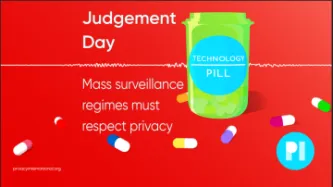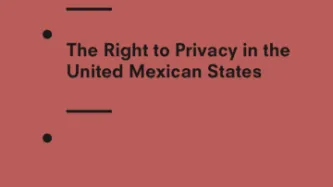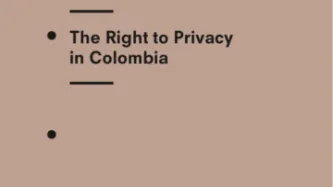Search
Content type: Video
Find out more on our website: https://privacyinternational.org/long-read/4206/qa-eus-top-court-rules-uk-french-and-belgian-mass-surveillance-regimes-must-respect
And make sure we can keep taking these fights to court: support.privacyinternational.org
You can listen and subscribe to the podcast where ever you normally find your podcasts:
Spotify
Apple podcasts
Google podcasts
Castbox
Overcast
Pocket Casts
Peertube
Youtube
Stitcher
And more...
Content type: Long Read
Q&A: EU's top court rules that UK, French and Belgian mass surveillance regimes must respect privacy
Content type: Press release
By treating everyone as a suspect, the bulk data collection or retention regimes engage European fundamental rights to privacy, data protection, freedom of expression, as guaranteed respectively by Articles 7, 8, and 11 of the EU Charter of Fundamental Rights.
Caroline Wilson Palow, Legal Director of Privacy International, said:
"Today’s judgment reinforces the rule of law in the EU. In these turbulent times, it serves as a reminder that no government should be above the law. Democratic…
Content type: Press release
Today, the ICO has issued a long-awaited and critical report on Police practices regarding extraction of data from people's phones, including phones belonging to the victims of crime.
The report highlights numerous risks and failures by the police in terms of data protection and privacy rights. The report comes as a result of PI’s complaint, dating back to 2018, where we outlined our concerns about this intrusive practice, which involves extraction of data from devices of victims, witnesses…
Content type: Examples
At least 27 countries are using data from cellphone companies to track the movements of their citizens, and at least 30 have developed smartphone apps for the public to download. Fewer objections have been raised in countries with greater levels of success in containing the virus. However, although Turkey has one of the worst outbreaks there has been little pushback against the surveillance even though the government is forcibly tracking people over 65, who are not allowed to leave their homes…
Content type: Explainer
In a scramble to track, and thereby stem the flow of new cases of Covid-19, Governments around the world are rushing to track the locations of their populace. One way to do this is to leverage the metadata held by mobile service providers (telecommunications companies - "Telcos" - such as Hutchison 3 (Also known as Three), Telefonica (Also known as O2), Vodafone, and Orange) in order to track the movements of a population, as seen in Italy, Germany and Austria, and with the European Commission…
Content type: Examples
Mexico is one of the biggest buyers of next-generation surveillance technology. And now data leaked to Forbes indicates it's taken an unprecedented step in becoming the first-known buyer of surveillance technology that silently spies on calls, text messages and locations of any mobile phone user, via a long-vulnerable portion of global telecoms networks known as Signalling System No. 7 (SS7).
The revelation was contained in what an anonymous source close claimed was…
Content type: Examples
The whistleblower said they were unable to find any legitimate reason for the high volume of the requests for location information. “There is no other explanation, no other technical reason to do this. Saudi Arabia is weaponising mobile technologies,” the whistleblower claimed.
The data leaked by the whistleblower was also seen by telecommunications and security experts, who confirmed they too believed it was indicative of a surveillance campaign by Saudi Arabia.
The data shows requests for…
Content type: Examples
8 europeans telecoms providers (Vodafone, Deutsche Telekom, Orange,Telefonica, Telecom Italia , Telenor, Telia and A1 Telekom Austria) have agreed to share mobile phone location data with the European Commission to track the spread of the coronavirus.
The Commission said it would use anonymsed data and aggregated mobile phone location to coordinate the tracking of the virus spread. They also announced the data would be deleted after the crisis.
Source: https://www.reuters.com/article/us-…
Content type: Impact Case Study
What HappenedOn 5 June 2013, The Guardian published the first in a series of documents disclosed by Edward Snowden, a whistleblower who had worked with the NSA. The documents revealed wide-ranging mass surveillance programs conducted by the USA’s National Security Agency (NSA) and the UK’s Government Communications Headquarters (GCHQ), which capture the communications and data of hundreds of millions of people around the world. In addition to revealing the mass surveillance programs of the NSA…
Content type: Advocacy
This report is presented by Red en Defensa de los Derechos Digitales (R3D) and Privacy International (PI). La Red en Defensa de los Derechos Digitales (R3D) is a non-governmental, non-profit organisation located in Mexico, dedicated to the defence of human rights in the digital environment. Privacy International (PI) is a non-governmental, non-profit organisation located in London, focused on the defence, promotion and protection of the right to privacy around the world.
PI and R3D wish to…
Content type: Press release
Privacy International, Liberty, and Open Rights Group have joined over 60 NGOs, community groups, and academics across the European Union to file complaints to the European Commission. The complaints call for the EU governments to stop requiring companies to store all communications data. The practice was ruled unlawful by the Court of Justice of the European Union (CJEU) in two separate judgments in 2014 and 2016. The UK complaint was filed by Privacy International, Liberty, and Open Rights…
Content type: Impact Case Study
PI and our global partners have been at the forefront of challenging communications data retention for over a decade.
What is the problem
Communications data, also known as metadata, tells a story about your digital activity and answers the who, when, what, and how of a specific communication. While communications data doesn't include the contents of a message, all of the other information about the message can be very revealing about people, their habits, thoughts, health and personal…
Content type: Advocacy
Este informe de terceras partes interesadas es una contribución escrita presentada por Dejusticia, Fundación Karisma y Privacy International (PI). Dejusticia es una organización de derechos humanos colombiana que brinda conocimientos especializados sobre derechos humanos. Fundación Karisma es una organización de la sociedad civil colombiana que busca dar respuesta a las oportunidades y a las amenazas que surgen en el contexto de la tecnología para el desarrollo para el ejercicio de los derechos…
Content type: Advocacy
This stakeholder report is a submission by Dejusticia, Fundación Karisma and Privacy International (PI). Dejusticia is a Colombian human rights organization that provides expert knowledge on human rights. Fundación Karisma is a Colombian civil society organization that seeks to respond to the opportunities and threats that arise in the context of ‘technology for development’ for the exercise of human rights. PI is a human rights organisation that works to advance and promote the right to…
Content type: Press release
The Case
Privacy International v Secretary of State for Foreign and Commonwealth Affairs et al. (Bulk Personal Datasets & Bulk Communications Data challenge)
Date: 5-9 June 2017
Time: from 10:00 onwards
Location: Royal Courts of Justice, The Strand, London WC2A 2LL United Kingdom
Hearing overview
Next week’s hearing follows the Investigatory Powers Tribunal’s earlier judgment in October 2016, which ruled that three issues are to be determined:
…
Content type: Long Read
Privacy International is celebrating Data Privacy Week, where we’ll be talking about privacy and issues related to control, data protection, surveillance and identity. Join the conversation on Twitter using #dataprivacyweek.
Exercising the right to privacy extends to the ability of accessing and controlling our data and information, the way it is being handled, by whom, and for what purpose. This right is particularly important when it comes to control of how States perform these activities.…










